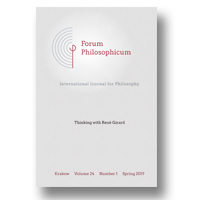|
articles |
|
21.
|
Forum Philosophicum:
Volume >
28 >
Issue: 1
Jaeha Woo
On the Need for Distinctive Christian Moral Psychologies:
How Kant Can Figure into Christian Ethics Today
abstract |
view |
rights & permissions
| cited by
I show how those with Kantian habits of mind—those committed to maintaining certain kinds of universality in ethics—can still get involved in the project of securing the distinctiveness of Christian ethics by highlighting parts of his moral philosophy that are amenable to this project. I first describe the interaction among James Gustafson, Stanley Hauerwas, and Samuel Wells surrounding the issue of the distinctiveness of Christian ethics, to explain why Kant is generally understood as the opponent of this project in this discourse. Then I lay out his discussions of how his moral argument for postulating divine existence can have beneficial moral-psychological results, and of how we can find moral satisfaction, the sense of pleasure in our moral strivings, as two elements in his moral philosophy that can be turned into a distinctively Christian ethics with revisions that should be allowed within the broad confines of Kantian moral philosophy. I also point out that his own answer to the question of moral satisfaction is already distinctively Christian, in that it is inspired by the Christian tenets of the imputation of righteousness and the assurance of salvation.
|
|
|
|
|
22.
|
Forum Philosophicum:
Volume >
28 >
Issue: 1
Tymoteusz Mietelski
Paolo Valori on Searching for Truth Everywhere as a Feature of Christian Philosophy
abstract |
view |
rights & permissions
| cited by
This article presents the views of Paolo Valori (1919–2003), a little known philosopher and Italian Jesuit who was one of the first scholars in Italy to deal with Husserl’s thought. Valori belonged to the so-called “second wave” of Italian phenomenology. His critical analysis of Maurice Blondel’s views, and his reflections on contemporary philosophy, led him to the conclusion that a dialogue between Christian philosophy and contemporary thought is called for. One aspect of this dialogue may be the opening up of Christian philosophy to the search for truth in the human sciences, and to various tendencies in philosophy and theology. Such an opening can be called “the search for truth everywhere.” The article presents the sources of Valori’s views and his understanding of interdisciplinary dialogue. This analysis is supplemented by a!presentation of his concept of truth, and the text ends with an example of the practical application of this approach within his conception of phenomenological ethics.
|
|
|
|
|
reviews |
|
23.
|
Forum Philosophicum:
Volume >
28 >
Issue: 1
Jacek Surzyn
Franciscus Bargieł: Jan Morawski SJ (1633-1700) Philosophy
view |
rights & permissions
| cited by
|
|
|
|
|
24.
|
Forum Philosophicum:
Volume >
28 >
Issue: 1
Maciej Jemioł
Report from the debate: How to think with Heidegger against Heidegger?
view |
rights & permissions
| cited by
|
|
|
|
|
25.
|
Forum Philosophicum:
Volume >
28 >
Issue: 1
Maciej Jemioł
Christian Philosophy facing Naturalism. September 24–25, 2024, Jesuit University Ignatianum in Krakow. Conference Invitation Letter
view |
rights & permissions
| cited by
|
|
|
|
|
|
|
26.
|
Forum Philosophicum:
Volume >
28 >
Issue: 1
Note about Forum Philosophicum
view |
rights & permissions
| cited by
|
|
|
|
